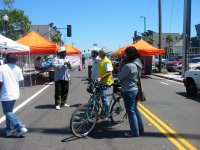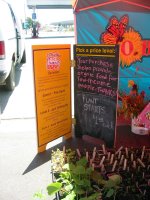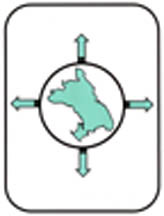 Mandela Farmers Market:
Mandela Farmers Market:We could hear the farmers market before we saw it; some old soul music was wafting through the breeze. Before we entered the market itself, we saw a fellow, who is almost an Oakland landmark himself, painting the scene. The market was smaller than we had imagined, with only a few people milling about. It was the 4th of July weekend, and it seemed that much of the city cleared out for a long weekend holiday. The market is about two blocks long; what it lacks in size, it makes up for in variety. Along with fruit and veggie vendors, there were some folks selling handcrafted shea butters and skin products, paintings, used books, records and tapes, as well as some prepared food. Because of the market’s small scale, our arrival to the market caused somewhat of a scene. The DJ, David, announced our presence over the PA by preaching “Where’s East Oakland? Where’s West Oakland? It’s right here, brothers and sisters!”. We waved, and set-up our rig, eager to join in the festivities.
It didn’t take long before we were deep in conversation with folks about the market, how it started and who is there. The Mandela Market, also called the Mo’ Better Foods Market, was first started in 1998. You can read here a full history of the development of the market and more information about Mo’ Better Foods. One of the main goals of the market is to support black farmers in order to bring healthy, organic and affordable produce to black communities. Here is a list of Mo’ Better Foods’ economic priorities:
- Assist Black farmers with their production
- Develop markets for their produce in urban communities
- Create farmers markets in the inner cities throughout the U.S.*
- Develop a community outreach /marketing team to promote the produce of the farmers, present special events including local talent, etc, to the market and other venues.
- Certify kitchens in the community to conduct cooking demonstrations and promote entrepreneurship by supporting catering business and congregation of cooks in general.
- Create distribution outlets for the farmers utilizing corner stores
- Develop Cooperative Grocery Stores in urban communities
And here's a fact that fuels their efforts: "Every year, African Americans lose between 500,000 - 900,000 acres. In 1910, African Americans owned around 15 million acres. Currently, African Americans own between 2 million acres and 8 million acres (if you include heir property which many of us just pay taxes on). In 1910, there were roughly 54,000 Black farmers in the United States. Today, there are around 18,000 African American farmers in the U.S (mostly in the Southern states of the U.S)."
We met with some of the local farmers and artisans; OBUGs (Oakland Based Urban Gardens) is a local non-profit that believes using farming and nutrition to build community. They have several plots of community garden land throughout West Oakland. They sell gorgeous flowers and veggies at the market that are grown right in the neighborhood. True to their mission, they have a very accessible pricing structure: free, next to nothing, and Berkeley Bowl prices. It is up to the shopper to choose the appropriate price range. They also sell goods produced by the City Slicker Farms,a group that “…seeks to increase food self-sufficiency in West Oakland by creating organic, sustainable, bio-intensive market farms and back-yard gardens that provide affordable fresh produce to West Oakland residents. These gardens also create earning opportunities for participants and serve as community spaces for children and adults who want to learn about the connections between ecology, farming, and the urban environment.”
It was inspiring and invigorating to be among grass-roots activists who are working are changing their community. Plus we ate some of the best strawberries that we have ever tasted! One woman we spoke with told us that since eating the greens from the market, she has gotten a new lease on life: all of her environmental illnesses and allergies have disappeared. We felt welcomed at the market, and folks there wanted us to encourage EVERYONE to come to the Mandela Market on Saturday mornings.







0 Comments:
Post a Comment
<< Home